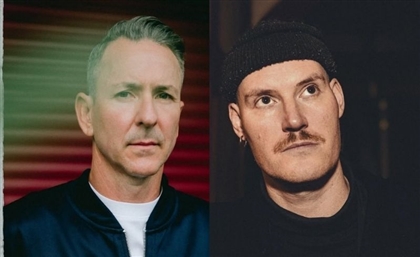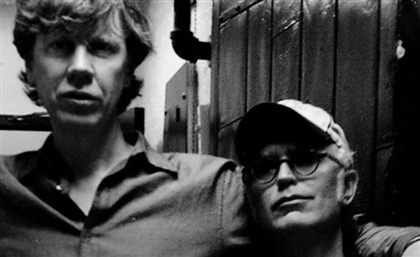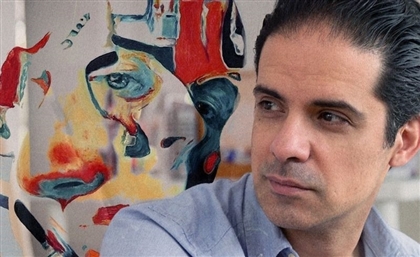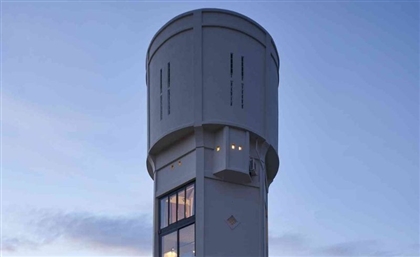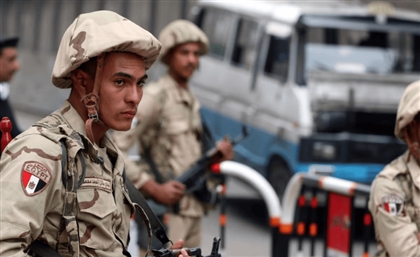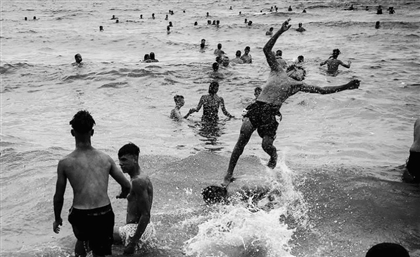The Sound of Palestinian Resistance: Now and Then
In this list, we've compiled songs that take us through the history of Palestinian resistance music.
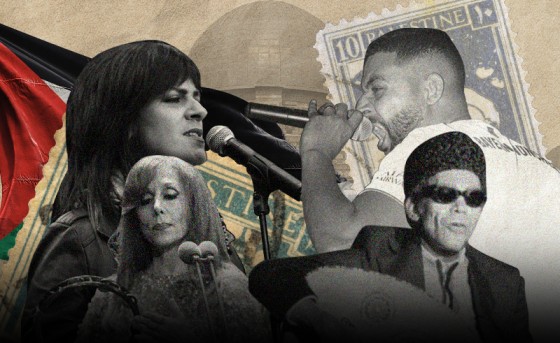
In a decades-long oppression that continually affects millions within Palestine and amongst the diaspora of its people, Palestinians have struggled to have their voice heard through traditional media outlets. Determined to speak out and break the silence, over the years, Arab and Palestinian artists have found a way to discuss the conflict's complexity through music, by voicing their daily struggles, their dreams of a brighter future, and the surreal experiences of living with war, occupation and genocide.
In this list, we've compiled songs that take us through the history of Palestinian resistance music, where artists and poets address specific moments of the conflict, dealing with their grief and frustration, and painting a more well-rounded picture of how Palestinians feel about the extraordinary circumstances they have been put through along the years.
Sheikh Imam | Ya Falasteeniyah
Legendary Egyptian musician Sheikh Imam’s rendition of 'Ya Falasteeniyeh', a poem belonging to 'The Poors' Poet' Ahmed Fouad Negm, speaks to a universal feeling amongst Arabs, as he expresses his willingness to defend the nation of Palestine, while imagining a day of liberation for its people.
Fairuz | Zahrat El Mada’en
In her ode to Jerusalem, legendary Lebanese singer Fairuz expresses the deep grief felt by Arab people around the world. She sings about the eyes and hearts that extend to Jerusalem every day, and how the beauty and rich history of the city will not be forgotten. She dreams of a day where the city will be liberated from apartheid, and where the buildings, mosques, churches, and the people of the city will have the looming heartbreak lifted, and when Palestine will know peace again.
Sabreen Band & Kamilya Jubran | Hob A'l Tariqa Al Filisteeniya
Translating to ‘Love, The Palestinian Way’, the haunting track by Sabreen band and Kamilya Jubran, originally a poem by the Palestinian writer and poet Abdul Latif Aql, takes us into the perspective of a Palestinian political inmate, whose imprisonment is met with humiliating assault and physical abuse by his captors. Despite this, the inmate retains his optimism, addressing his words to a loved one, reassuring them that his hunger will be sated with Zaatar, and that his love will remain strong, whether he is alive or dead.
Julia Boutros | Wein el Malayeen
Lebanese/Palestinian singer Julia Boutrous has been a strong advocate of the cause throughout her career, and in her confrontational track ‘Wein El Malayeen’, goes to hold Arabs accountable for their silence, asking, “Where are the millions? Where is the outrage? Where is the pride?” In doing so, she calls all people of Arabic heritage to stand in solidarity with their occupied Palestinian brothers and sisters.
Muslimgauze | Every Grain Of Palestinian Sand
British musician and producer Bryn Jones was not a practicing Muslim and never traveled to the Middle East. His recordings as Muslimgauze, however, qualified him as one of the Western artists most explicitly slanted in favor of the Palestinian liberation movement. This track, like most of his work, is an instrumental ode to Palestine.
Rim Banna | Algha'eb
The track is a rendition of Palestinian writer Rashid Hussein’s poem by the same name, in which the lyrics address the enactment of the ‘Absentee's Property’ law, which states that the property which had once belonged to the Palestinian refugees evicted in 1948 would become owned by the Israeli occupation. This law also applied to Palestinian mosques and churches, leading Hussein to make the metaphor in his poem that imagines God himself to have also become a refugee due to the occupation.
Muqata’a | Qabl W Ba’l
Muqata’a’s ‘Qabl W Ba’l’ embodies resistance in its purest form—it’s a clarion call to disrupt, boycott, and interfere. The legendary Ramallah rapper delivers a searing analysis of the occupying power, referencing the brutal events in Palestine, dissecting the occupier's mindset, and issuing a fervent call to resist. This message is executed through heavily experimental production, driven by Muqata’a’s potent writing, thought-provoking bars, and profound lyrics. The result is a powerful and defiant musical manifesto that challenges and inspires.
Shadia Mansour | El Koffeye Arabeyye
With the rising popularity of rap music in the Arab world and in Palestine in the early 2000s, we’ve heard many Palestinians using the artform as an outlet for their outrage. Palestinian rapper Shadia Mansour who explicitly airs her grievances about cultural appropriation, specifically around the use of the Palestinian Koffeye as a headscarf and fashion piece in other areas of the world, with no awareness of its cultural significance and the symbolism it holds.
MC Abdul | The Pen and the Sword
15 year old rapper MCA is currently taking the world by storm, performing alongside musical giants such Palestinian rapper Saint Levant, and featuring on YUNG magazine. Recently relocated to the US to expand his musical foothold, MCA’s music mostly chronicles the occupation through his eyes. His most recent release, ‘The Pen and the Sword’, celebrates education over violence and emphasizes on every child’s right to proper schooling.
Shadia Mansour and DAM | Kollon 3endon Dabbabat
At the peak of old-school Palestinian hip-hop, Shadia Mansour and DAM were two of the most influential acts to lead the voice of resistance at the time, making strides to propel the issue deeper into international consciousness. The track ‘Kollon 3endon Dabbabat’ addresses the people of Palestine, and Gaza in particular, stating that their sacrifices will not go in vain, and that victory is yet to come. The track also speaks to the fact that Palestinians ask no more of the international community than acknowledgement and justice, but that they have been met instead with apathy and cold silence in return.
Daboor and Shabjdeed | Inn Ann
In recent years, ‘Inn Ann’ has become an anthem heard at Palestinian protests around the world. The track speaks to a new generation of Palestinian youth, as it shows rappers Daboor and Shabjdeed from Palestinian label BLTNM staunchly hold their ground on their values, and defiantly stating that now is the time for action.
Shabjdeed | Mantika
As an artist who doesn’t necessarily categorize his work as political, Shabjdeed simply uses his music to revisit his day to day experience. But with the nature of the situation in Palestine, these accounts are deeply politicized by nature. Nonetheless, Shabjdeed’s perspective on the matter isn’t one that is sympathetic, nor one that is overly poetic or even optimistic. Instead, he has stood out with his raw and confrontational lyrical style, which we hear in ‘Mantika’, where Shabjdeed stumbles upon the revelation that the war is a part of his fiber, and a big part of who he is, as he has been raised on it all his life.
Mashrou’ Leila | Cavalry
The lead single from Mashrou’ Leila’s last album ‘The Beirut School’ centers on the devastating cruelty and machismo of militarized oppression, which infiltrates homes and impacts domestic life. Recalling Ahed Tamimi, the Palestinian teenager arrested outside her home for confronting Israeli soldiers and thrust into the public eye as an activist.
Elyanna | Khels El Haki
Palestinian-Chiliean singer Elian Marjieh - formally known by her stage name Eliyanna - is both a social media icon and widely-recognized Nazareth-born singer. Her two released EPs, ‘Elyanna I’ and ‘Elyanna II’, have garnered the attention of music giants, and led to her being signed with Universal Arabic Music. In her track, ‘Khels El Haki’, she delivers a powerful vocal performance that carries her heartbreak as she sends her prayers to her homeland.
Saint Levant & MC Abul | Deira
Palestinian artists Saint Levant and MC Abdul eloquently express their affection for their homeland, highlighting the resilience of the Palestinian people, their love for life, and their unwavering dreams of freedom. The track’s title "Deira'' also refers to a hotel built in Gaza by Abdelhamid’s father, Rashid, where four children were tragically killed by Israeli rockets in 2014, and being completely destroyed by bombings three months ago.
Belly | Patience vs. Patients
Palestinian-Canadian rapper Belly's ‘Patience vs Patients’ is a thought-provoking piece that delves deeply into the harsh realities faced by Palestinians living under occupation. It starkly contrasts the notions of patience and patients to underscore the grueling circumstances under which Palestinians live and their relentless struggle for freedom and dignity.
Macklmore | Hind’s Hall
Macklemore - who has previously spoken out against his own government's policies in support of Israel - named this track after a student takeover of Columbia University’s Hamilton Hall, during which the building was renamed ‘Hind’s Hall’. The students chose the name in memory of Hind Rajab, a six year old Palestinian girl who was killed by Israeli tanks after they had trapped her in a car with her dead relatives for hours in February 2024. Medical workers who were sent to rescue Hind were also killed by the Israeli army.








